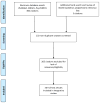Exercise as an Intervention to Mitigate Decreased Cognitive Function From Cancer and Cancer Treatment: An Integrative Review
- PMID: 29194066
- PMCID: PMC5975081
- DOI: 10.1097/NCC.0000000000000549
Exercise as an Intervention to Mitigate Decreased Cognitive Function From Cancer and Cancer Treatment: An Integrative Review
Abstract
Background: Decreased cognitive function associated with non-central nervous system cancers and cancer treatment significantly affects cancer survivors' quality of life. Exercise may be an effective intervention to mitigate decreased cognitive function.
Objective: The aim of this article is to conduct an integrative review to summarize and critique the available evidence related to the use of exercise as a potential intervention for decreased cognitive function from cancer and cancer treatment.
Methods: We conducted an integrative review through January 2016 utilizing PubMed, CINAHL, and PsycINFO. Broad inclusion criteria included any quantitative study in which cognitive outcomes were reported in relationship to any type of exercise for adult cancer survivors. Effect sizes were calculated when possible based on available data.
Results: Twenty-six studies were included for review. The majority of studies (including aerobic or resistance exercise as well as mindfulness-based exercise) were associated with some improved cognitive outcomes. However, studies varied significantly in levels of evidence, cognitive domains assessed, and types of cognitive measures. Less than half of the studies included objective measures of cognitive function.
Conclusions: The evidence shows promising trends for the use of exercise as a potential intervention for improving cognitive function following cancer and cancer treatment, but questions remain concerning exercise type, timing of initiation, intensity, frequency, and duration.
Implications for practice: Additional research is warranted to understand how various types of exercise influence cognitive function in the cancer survivor population and to better understand the mechanisms driving these effects. Trial designs that include both objective and subjective measures of cognitive function are needed.
Conflict of interest statement
References
-
- Wefel J, Vardy J, Ahles TA, Schagen SB. International cognition and cancer task force reommendations to harmonise studies of cognitive function in patients with cancer. The Lancet Oncology. 2011;12:703–708. - PubMed
-
- Koppelmans V, Breteler MM, Boogerd W, Seynaeve C, Schagen SB. Late effects of adjuvant chemotherapy for adult onset non-CNS cancer; cognitive impairment, brain structure and risk of dementia. Clinical Reviews in Oncology/Hematology. 2013;88:87–101. - PubMed
Publication types
MeSH terms
Grants and funding
LinkOut - more resources
Full Text Sources
Other Literature Sources
Medical


